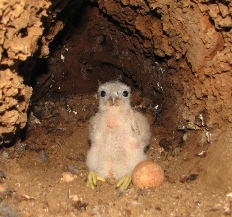Climate change affects breeding success in rare tropical bird
Release Date 23 March 2011

A new study from the University of Reading highlights how climate change is having a detrimental effect on an endangered tropical bird population.
Researchers looked at the Mauritius kestrel as an example of how increased rainfall can affect the number of chicks raised in tropical climates.
The breeding season of this bird of prey spans the Southern Hemisphere spring/summer, with the earliest eggs being laid in early September and the latest fledglings leaving the nest in late February.
The results show that female kestrels begin breeding later as the frequency of rainfall in August increases, and all individual females within the population appear to respond to changing rainfall conditions in the same way. Birds breeding relatively late in the season have lower reproductive success (fledgling production) compared with birds breeding earlier.
For every extra day of rainfall in August, individual birds delayed breeding by approximately half a day.
Delayed breeding increases the risk that nests will be exposed to rainfall, which lowers breeding success. This reduced breeding success could occur for two main reasons - the hunting efficiency of breeding adults might be reduced because of lower prey detection in wetter conditions, or nests might be flooded increasing the risk of hypothermia in chicks.
Deepa Senapathi, of the University's Centre for Agri-Environmental Research, said: "Phenological shifts, such as changes in timing of breeding, are key processes affecting the impact of climate change on wild populations. Our study suggests that climate change has produced conditions that cause higher frequency of rainfall in Mauritius when compared to the 1960s. This results in relatively late breeding and consequently an increased risk of breeding birds being exposed to adverse rainfall conditions during nesting.
"Our results raise the possibility that different mechanisms might operate in sub-tropical/tropical populations in which the timing of breeding is influenced by rainfall conditions rather than temperature, as we are seeing with different species in the UK and in Europe."
ENDS
For further information please contact Rona Cheeseman, press officer, on 0118 378 7388 or email r.cheeseman@reading.ac.uk
Notes to editors
‘Climate change and the risks associated with delayed breeding in a tropical wild bird population' by Deepa Senapathi, Malcolm A. C. Nicoll, Celine Teplitsky,
Carl G. Jones and Ken Norris is published in the Royal Society journal Proceedings of the Royal Society B on Wednesday 23 January 2011.
The study was conducted in the east coast mountain range in Mauritius. The study population was wiped out during the 1950s, but reintroduced at the end of the 1980s as part of a recovery programme. The population has grown and has now become stabilized at approximately 45 breeding pairs.
The research was conducted in conjunction with the Mauritius Wildlife Foundation (MWF) and the National Parks and Conservation Service (NPCS). The Mauritius kestrel recovery programme was supported by the Durrell Wildlife Conservation Trust (DWCT) and Peregrine Fund.
